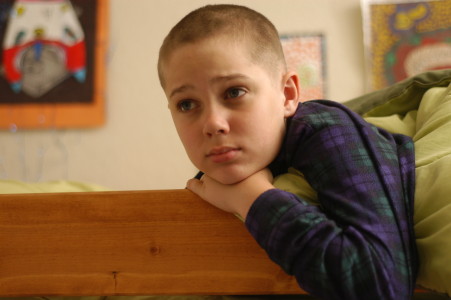Fri 19 Dec 2014
My 2014 Top Ten
Posted by admin under Features
Comments Off on My 2014 Top Ten
If you’re sick of reading people praising Boyhood…sorry.
1) Boyhood
Boyhood may not be Richard Linklater’s finest movie (I’d rank the entirety of the Before trilogy ahead of it, with A Scanner Darkly a possible second in the conversation), but it’s the one that perhaps best encapsulates who he is as a filmmaker. His penchant for locating big ideas within the rhythms of ordinary, everyday life—something that’s defined his style since his breakout debut, Slacker—is given its grandest stage here, as he follows one group of characters over the course of 12 years. The finished product feels at once both carefully planned and marvelously in the moment, with Linklater’s observational shooting style picks up on little details about his characters that speak volumes about the way their lives unfold. There are aspects about Boyhood that don’t quite track—I think that star Ellar Coltrane becomes a less interesting screen presence as he ages, and I wish that Patricia Arquette had been allowed to directly answer Ethan Hawke’s self-serving characterization of their failed marriage—but the film’s deep interest in human behavior and the way our decisions ripple outwards through time, dovetail with fascinations I’ve always had. Without knowing it, I’ve always wanted to see a movie exactly like Boyhood and I’m so pleased that Linklater was the one to make it.
2) Mr. Turner
Of the three British biopics released this year—The Imitation Game, The Theory of Everything and Mr. Turner—only Mike Leigh’s film about 19th century artist J.M.W. Turner really punctures the genre’s surface trappings to get at the complex, contradictory individual who once lived, breathed and, in this case, painted. Working with frequent collaborator Timothy Spall, who accomplishes the impossible task of seeming both larger-than-life and remarkably grounded, Leigh illustrates how Turner was both a product of his time and yet stood outside of that time, charting his own course in bold, if not always admirable ways. Most narrative features about great painters focus on what’s on the canvas at the expense of the person creating those images. Mr. Turner effortlessly accomplishes both.
3) National Gallery
A natural companion piece (and unofficial sequel) to Mr. Turner, Frederick Wiseman’s latest opus takes viewers inside the hallowed halls of the titular London art museum for a three-hour tour that explores the role of this specific institution in the preservation of art and the continued education of the public. The connection to Leigh’s film aren’t just the Turner paintings that adorn the walls of the National Gallery; it’s the way that Wiseman is similarly drawn to questions of artistic intent and the constantly-evolving attitudes about what constitutes “great†art. It’s no accident that my top three movies of the year are all, at heart, studies in behavior; Boyhood and Mr. Turner address the human side of the equation, while National Gallery tackles the behavior of an entire institution.
4) Under the Skin
Behavior also plays a key role in Jonathan Glazer’s remarkable third film, which provides the best answer I’ve ever seen to the age-old question: “If an alien landed on Earth, what would they make of human society?†The director offers his take by chronicling the experiences of Scarlett Johansson’s terrestrial visitor, who is placed by her minders in Glasgow, Scotland and tasked with using her adopted feminine charms to separate young men from their flesh. Glazer deliberately omits anything resembling exposition or backstory from the proceedings, making Under the Skin an entirely experiential picture that successfully shows us our world in all its strange, chaotic and haunting glory through another’s eyes.
5) The Tale of Princess Kaguya
Hayao Miyazaki’s contemporary and collaborator at Studio Ghibli, Isao Takahata, offers his take on one of Japan’s oldest and most famous legends. Illustrated in the style of Japanese scroll paintings, Kaguya is remarkable for its resplendent hand-drawn animation alone. But the film is also a narrative and thematic marvel, with Takahata using this myth as a springboard to exploring such subjects as parental ambition and how it clashes with familial love, as well as a young woman’s desire to assert her independence in a restrictive society. Just as last year’s The Wind Rises appears to be Miyazaki’s final film, Kaguya will likely serve as Takahata’s career capper. And what a film to retire on.
6) The Babadook
More than just a skillfully executed combination of Kubrick’s The Shining and Polanski’s Repulsion, Jennifer Kent’s debut feature is also a rich psychological look at an aspect of parenthood most parents don’t like to talk about—namely, those difficult (and hopefully rare) moments when you can’t stand to be around your “darling†children. Breakout star Essie Davis plumbs depths of emotion and terror that few actors from the past year have reached and her onscreen son, Noah Wiseman, gives one of the most natural, unaffected performances by a young actor I’ve seen in some time. The Babadook impressed me the first time around, but the second viewing left me gasping for air.
7) Only Lovers Left Alive
My initial impression of Jim Jarmusch’s gothic vampire romance-cum-musical was that it belonged amongst the director’s minor, but still eminently enjoyable, works. (A space occupied by such past Jarmusch films as Coffee and Cigarettes and Mystery Train.) But in its low-key way, the film has haunted me ever since. Credit the sly performances of Tilda Swinton and Tom Hiddleston, Jarmusch’s deadpan wit and cinematographer Yorick Le Saux’s beautiful nighttime photography, which contrasts between Detroit’s urban desolation and Morocco’s Old World lushness. Only Lovers also serves as an elegy for type of musician that the director himself clearly knew back in the good ol’ bad days of early ‘80s New York. The movie’s alternate title could easily be Goodbye to All That.
8) Snowpiercer
Having since read the (mostly terrible) graphic novel that the film is based on, I’m even more impressed by Bong Joon-ho’s turbo-charged post-apocalyptic adventure, which sends Chris Evans hurtling through the titular train on a desperate mission to reach the engine. A marvel of production design, each car Evans passes through is a unique world unto itself with a distinct social order and set of rules. And while the movie’s messaging at times borders on heavy-handed, the director’s non-stop energy and flair for imaginative set-pieces keep it zipping along. Hands down, Snowpiercer proved the most exhilarating action movie I saw all year.
9) The One I Love
The highest praise I can afford this low-fi piece of sci-fi is that it feels like the kind of story a genre master like Ray Bradbury or Robert Heinlein might have written back in their heyday. Taking a premise that seems more suited to a short story than a feature film, director Charlie McDowell and screenwriter Justin Lader nevertheless plot it out just right, consistently surprising the audience and upending our expectations as to where the story might be headed. Also, full credit to Mark Duplass and, especially, Elisabeth Moss, for not getting tripped up by the central gimmick and creating not just two, but four distinct, memorable characters.
10) The LEGO Movie
I’ll admit that a big part of my affection for Phil Lord and Chris Miller’s nimble, relentlessly enjoyable celebration of all things Lego is due to the fact that they’ve effectively remade the entire Matrix trilogy as a kids’ movie. (Nice to see that someone else loves Reloaded as much as I do.) But there’s so much else here to adore besides, whether it’s the mash-up of different characters and personalities, the rapid-fire gags that recall vintage ZAZ comedies like Airplane! or the climactic reveal in what I’ll call “The Architect†scene. Out of the most unlikely of materials, Lord and Miller have pieced together a family movie that’s built to last.
The Next Ten
11) Inherent Vice
Something is happening in P.T. Andeson’s latest joint and I’m not sure what it is, which is why it fell one short of cracking the Top 10. But I have no doubt I’ll be watching it again and again to figure it out…and once I do, I may just bump it all the way up to #1.
12) 12 O’Clock Boys
Lofty Nathan’s slender documentary about the titular Baltimore-based urban bike enthusiasts provides the Boyhood-like experience of watching a child come of age on camera, albeit on a much shorter timeline and in markedly different surroundings.
13) Edge of Tomorrow
Even a silly, nonsensical ending can’t spoil the pure fun of this summer’s best Hollywood-made blockbuster. And as good as Tom Cruise is, Edge ultimately belongs to Emily Blunt.
14) The Grand Budapest Hotel
Wes Anderson’s latest feature retains his exacting, precise craftsmanship, built atop a story that delivers an emotional wallop in its closing scenes.
15) Stranger by the Lake
An anti-thriller in the spirit of Blow Up, Alain Guiraudie’s one-setting mood piece expertly swings between happiness and joy to dread and foreboding.
16) Nightcrawler
While first-time director Dan Gilroy has a tendency to overdo it on the Network-style news media critique, Jake Gyllenhaal’s performance as a hybrid of Travis Bickle and Gordon Gekko (not to mention the stunning L.A.-after-dark cinematography by Robert Elswit) is a wonder to behold.
17) Foxcatcher
Steve Carell has nabbed the lion’s share of attention for Bennett Miller’s sturdy ripped-from-the-headlines true crime dramatization, but the true power (and tragedy) of the movie comes from Channing Tatum and Mark Ruffalo as the doomed pair of Olympic wrestling brothers.
18) Ida
Pawel Pawlikowski’s aesthetically spare, but dramatically potent drama quietly explores how ghosts from the past shape our present and future.
19) The Kingdom of Madness and Dreams
A rare glimpse into the legendary Japanese animation house Studio Ghibli and its storied leader, Hayao Miyazaki, sheds light on all the ordinary hard work that goes into creating his extraordinary works of cinematic art.
20) Interstellar
The supremely goofy, yet wholly enjoyable Interstellar proves once and for all that Christopher Nolan is too literal-minded a director to be our next Kubrick. On the other hand, it also confirms that he’s one of the few A-list Hollywood directors around with the formal skill to match his grand ambitions.
Honorable Mentions: Birdman, Cheap Thrills, Dawn of the Planet of the Apes, Godzilla (the direction), Gone Girl, Guardians of the Galaxy, The Guest, The Imitation Game, The Lunchbox, Jodorowsky’s Dune, Neighbors, Nymphomaniac Vol. 1, Obvious Child, Red Army, Selma, They Came Together, The Trip to Italy, 22 Jump Street, We are the Best!, Whiplash, Wild, Winter Sleep
Dishonorable Mentions: The Awkward Moment, Best Night Ever, Better Living Through Chemistry, Breathe In, Godzilla (the characters), Endless Love, Into the Woods, Made in America, Magic in the Moonlight, The Monuments Men, Ouija, Paranormal Activity: The Marked Ones, The Skeleton Twins, St. Vincent, V/H/S: Viral
Â
Â




No Responses to “ My 2014 Top Ten ”
Sorry, comments for this entry are closed at this time.